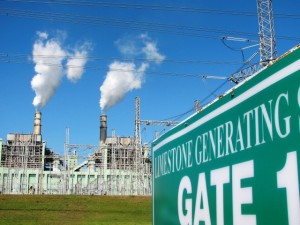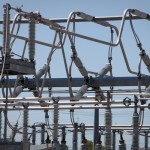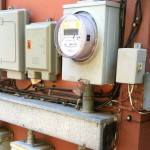The $4 Billion Texas Electric Bill

Photo by Dave Fehling
NRG Limestone Electric Generating Station in Limestone County
When it comes to spectator sports, it might not rank with college football in Texas. But when a state senate committee held a hearing last week to figure out if something is wrong with the state’s deregulated market for electricity, people far from Texas were glued to their computers, watching the hearing live over the internet.
“In all my experience, I’ve never really seen anything in which the Texas Public Utility Commission’s officials have been taken to task in such an aggressive manner by a state legislative hearing,” said Paul Patterson, a New York-based investment analyst who watched the hearing.
Patterson and others who keep close tabs on the nation’s electricity industry are eager to see how Texas handles a problem also facing other states: is there a risk of power shortages if more power plants aren’t built? And if the risk is real, who will foot the gigantic bill?
‘A massive subsidy’?
One idea under consideration in Texas is already being tried elsewhere. It’s called a “capacity market” and involves a state-regulated subsidy that would go to big energy companies to fund new power plants. It’s idea that has drawn strong critics in New Jersey.
“It’s a massive subsidy. And if you added up the subsidies for three plants it’s over $3 billion dollars in 15 years from ratepayers. It’s obscene,” said Jeff Tittel, director of the Sierra Club’s New Jersey chapter.
Tittel isn’t alone in his criticism. In October, a federal judge in New Jersey struck down the subsidy in a ruling in which he said it conflicted with federal regulation of wholesale power. New Jersey has since filed an appeal.
While there are differences in how the two state’s power grids are set up (Texas has its own market called ERCOT, New Jersey is one of 13 states in the PJM electric region) they may face similar futures says Patterson, the analyst in New York.
“Capacity markets around the country have been the source of litigation and conflict for some time. And I think it would be remarkable if that did not happen in Texas.”
Senators: Don’t Mess with Texas’ Electricity Market
A key assumption for setting up a subsidy is that new power plants are needed. In Texas, some of the senators at the hearing last week in Austin weren’t so sure that’s true. And compared to New Jersey, the stakes appear even more costly.
”Potentially we could be talking about passing as much as $4 billion per year in additional costs and we’ve got to determine is that really warranted,” said Troy Frasier, the Republican chair of the Senate Committee on Natural Resources.
In a pointed exchange with the three members of the Public Utility Commission who were called before the committee, Fraser made it clear he had serious doubts Texas is running out of electricity.
“It’s nice for us to project the sky is falling but we have to look at the reality we have. The market continues to work pretty well,” Fraser told the commission members.
PUC Chair Donna Nelson countered: “I’m not trying to project the sky is falling.”
When Sen. Fraser alleged the PUC was stepping beyond its authority by considering the use of a capacity market which his Democratic colleague Sen. Leticia Van de Putte likened to a “socialized system rather than a free market”, Nelson said: “ I believe one, it’s not a total redesign. And two, I believe a capacity market is still a market.”
Cost-benefit
“So who’s going to give us numbers on who’s going to pay for this? It’s the retail customers that’re going to pay for it,” said Sen. Van de Putte.
Nelson responded that “the end bill impact would be 1.4 percent” which she indicated was another way of expressing the $4 billion a year estimate for the subsidy’s total cost.
Nelson said the PUC had not looked at the “cost impact to retail customers” but would do further analysis. She said the PUC will be discussing this more at a meeting next month.
“Whatever we do, we will do it only if it makes sense from a cost-benefit standpoint. It is not my goal to over-procure electricity,” Nelson told the committee.

